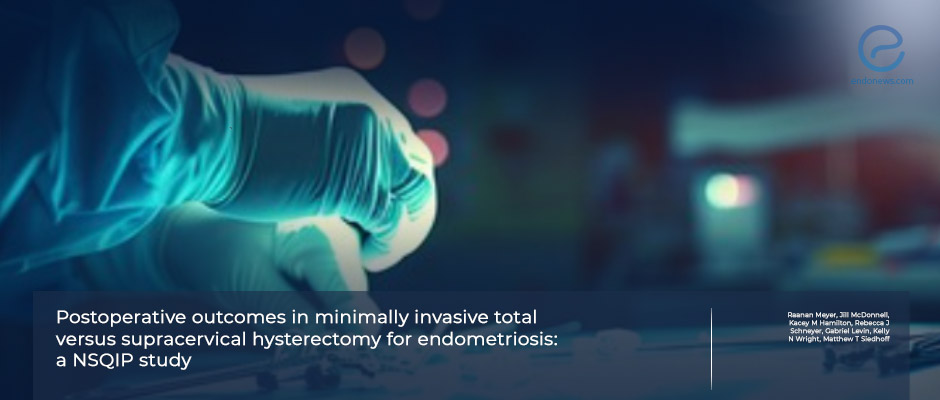Comparison of Postoperative Complications in Total vs. Supracervical Laparoscopic Hysterectomy for Endometriosis
Dec 26, 2024
Lower Risk of Short-Term Complications with Laparoscopic Supracervical Hysterectomy for Endometriosis
Key Points
Highlight :
- Laparoscopic supracervical hysterectomy (LSCH) demonstrates a significantly lower risk of short-term postoperative complications compared to total laparoscopic hysterectomy (TLH) in patients with endometriosis.
- While TLH remains the recommended approach for endometriosis treatment, the findings suggest that LSCH may offer a viable alternative with a better short-term safety profile.
Importance :
- LSCH is associated with fewer short-term postoperative complications than TLH for endometriosis, offering a potentially safer surgical alternative.
- Findings may inform clinical decision-making and guide future research on optimal surgical approaches for endometriosis.
What's done here :
- This is an observational study using the prospectively collected data from American College of Surgeons National Surgical Quality Improvement Program (NSQIP) database.
- Encompassing a total of 5,278 patients of whom 93.8% (4,952) total and 6.2% (326) underwent suracervical laparoscoopic hysterectomy.
Main key feature :
- LSCH was associated with significantly lower rates of any postoperative complications compared to TLH, for both major and minor ones.
Major limitations of the study :
- Observational nature of the study, which is not powered to detect differences for rare complications; ICD coding limitation, potentially missing some cases of endometriosis; lack of symptom severity data which impacts complication risks; short follow-up period; details of surgical approaches such as morcellation, mini-laparotomy, or colpotomy; type of laparoscopy (conventional vs. robotic); and uneven sample size are the main limitations.
Lay Summary
Dr. Raanan Meyer and his team from Cedars-Sinai Medical Center, Los Angeles, have published a study in Archives of Gynecology and Obstetrics, comparing the outcomes of total laparoscopic hysterectomy (TLH) and laparoscopic supracervical hysterectomy (LSCH) in patients with endometriosis.
A minimally invasive approach is usually preferred for surgery in endometriosis patients due to refractory to medical management, or for deep infiltrating type. Hysterectomy options include total or supracervical hysterectomies, where the cervix is not removed.
The authors investigated the association between hysterectomy type and the risk of short-term complications ((i.e.,30 days postoperatively), using the American College of Surgeons National Surgical Quality Improvement Program database. There was a total of 5,278 patients of whom 93.8% total and 6.2% underwent suracervical hysterectomy.
Complications occurred in 8.5% of TLH patients, compared to 3.7% in LSCH patients. Urinary tract infections were significantly higher in the TLH group.
The study concludes that LSCH is associated with fewer short-term complications than TLH for patients with endometriosis. The authors note that further research is needed on long-term complications, recurrence of endometriosis, and patient satisfaction regarding cervix retention in LSCH, especially when hysterectomy is chosen as definitive treatment.
Research Source: https://pubmed.ncbi.nlm.nih.gov/39412533/
endometriosis surgery hysterectomy postoperative complications

